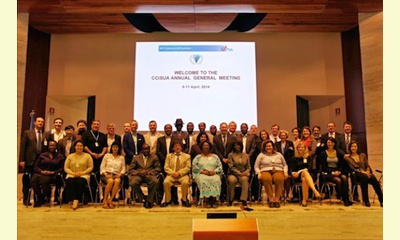|
|
Victory for workers' rights at the United Nations
an article by Ian Richards
, President of the Coordinating Committee of International Staff Unions and Associations
It gives me great pleasure to inform you that the campaign by UN
unions to restore the recognition rights of UN staff has secured a
successful outcome. 
Coordinating Committee of International Staff Unions and Associations
click on photo to enlarge
On behalf of the unions of the United Nations, I would like to thank
you, LabourStart and your 14,000 members who sent emails to UN
Secretary-General Ban Ki-moon for their fantastic support during
the campaign. Your efforts helped persuade the Secretary-General
and his team that the UN should live up to its principles on human
rights and labour representation.
We know that management only came back to the table because
unions, organizations and working people around the world were
united in their anger at the way the Secretary-General withdrew
trade union recognition last June.
The Secretary-General has agreed a new negotiating system that
significantly improves on the UN Staff Management Committee
(SMC) rules that applied previously. Most importantly, the right of
unions to represent UN staff has been restored, bringing to an end
the crisis in staff-management relations caused when the
Secretary-General’s representatives walked out of SMC.
This unilateral action by management left us unable to negotiate
over crucial system-wide issues such as mobility policy, safety and
security in the field, protection for whistle-blowers and rights for
dependents of UN staff killed and injured in service.
Highlights of the new negotiating system include:
Increased
regular contact on system-wide issues with formal meetings every
three months, meaning pressing items can no longer be kicked into
the long grass
If the Secretary-General doesn’t agree an SMC
recommendation, or agrees but doesn’t implement, the issue will
automatically come back to the table within strict time limits,
leading to swift renegotiation
Where there is clear
disagreement, we’ve regained the right to mediation as before, with
a third-party mediator appointed from an agreed roster and a strict
timetable for resolution
If an issue has to go to the General
Assembly, management will share the draft Secretary-General
report with staff, allowing us to intervene before any decision is
made.
Results of SMC meetings will be communicated to all
staff with a status report showing items ‘Agreed,’ ‘Not Agreed,’ or
‘Pending’.
The agreement represents a major success for UN staff and unions
and for our friends in the wider union movement. It would not have
been achieved without your support to our 'UN UNION RIGHTS'
campaign, the personal testimonies of staff, and media coverage in
the New York Times, Washington Post, The Guardian and other
newspapers internationally.
We have made new friends across the world and raised awareness
of the issues we deal with every day. These gains have strengthened
the position of the UN’s unions for the challenges ahead and you
played a key role in this. Thank you again.
(Thank you to Janet Hudgins, the CPNN reporter for this article.)
|








|
DISCUSSION
Question(s) related to this article:
The right to form and join trade unions, Is it being respected?
* * * * *
Latest reader comment:
The United Nations needs to be a good example for the respect of human rights!

|
|









